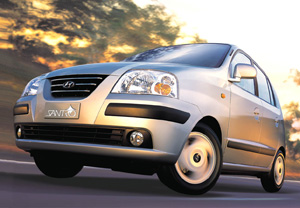
MUMBAI – Hyundai Motor India Ltd. plans to invest Rs27 billion ($600 million) over the next two years to establish a second engine and transmission plant.
The investment, which would take the auto maker's total expenditure in its Indian operations to Rs65 billion ($1.4 billion), is said to be part of as strategy to create an export hub for small cars.
Hyundai says it wants to enhance process capabilities, cut costs and raise quality at the proposed plant. Defect rates for components provided by 34 of its Tier 1 suppliers are currently at zero parts per million (ppm), but the auto maker wants to bring down the number for its other 60 suppliers from their current level of 100 ppm.
In the fiscal year ended March 31, Hyundai India sold 158,000 cars in the domestic market and saw a profit of Rs20 billion ($450 million) from 102,000 exports.
Despite competitive pressures, the company has emerged as India’s No.2 auto maker and has a 19.8% share of the market. Its flagship car, the Santro hatchback, consistently has been among the country's top-five best-selling models.
By 2008, Hyundai India expects exports to comprise from one third to one half of its production. Its sales network will double to 300 outlets and export distributors will triple to 150 worldwide, including Europe and South America, the company says.

Hyundai India also plans to launch a newly designed Verna as a successor to its Accent sedan and a 1-ton pickup truck to compete with the popular Tata Ace.
Managing Director H. S. Lheem says the auto maker is working on a new compact car, in addition to Santro.
"We are also working on a full range of diesel engines for all our models in each segment,” he says.
To further compete in the Indian market, Hyundai India is considering a reduction in its royalty payments of 5% on domestic sales and 8% on exports to parent Hyundai Motor Co. Ltd. in South Korea.




